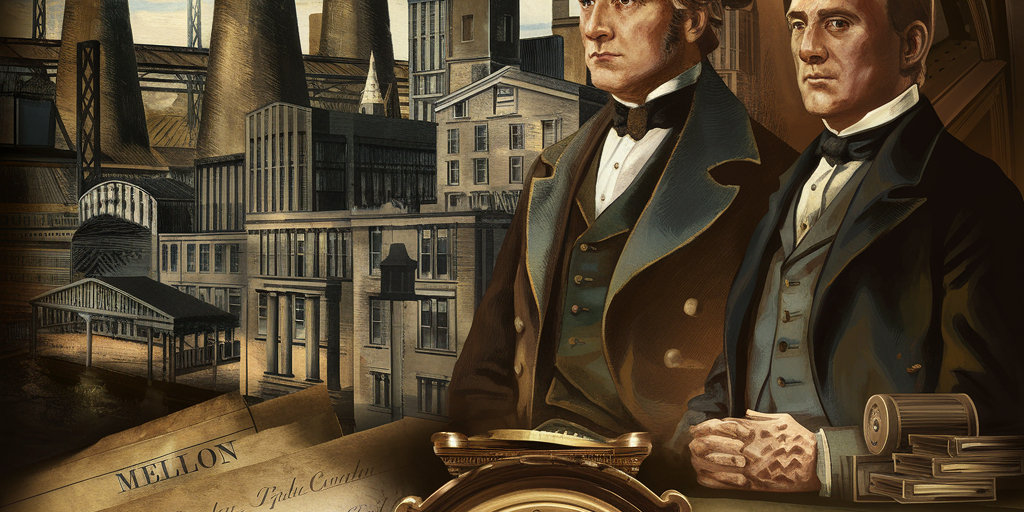Introduction: How One Pittsburgh Family Shaped American Finance
The Mellon family name is synonymous with Pittsburgh’s rise as a financial and industrial powerhouse. What began as a modest banking operation in 19th-century Pittsburgh evolved into one of the most influential family dynasties in American history. The Mellons didn’t just fund Pittsburgh’s steel mills and glass factories — they shaped Wall Street, Washington D.C., and the foundations of modern American capitalism.
This is the story of the Mellon banking dynasty, a tale of risk, vision, and generational wealth that transformed both Pittsburgh and the nation.
Humble Beginnings: Thomas Mellon and the Birth of a Banking Empire
The Mellon story begins with Thomas Mellon, a poor Irish immigrant who arrived in Western Pennsylvania in the early 1800s. After graduating from the University of Pittsburgh (then the Western University of Pennsylvania), Mellon became a lawyer and judge.
In 1869, sensing the potential of Pittsburgh’s booming industries, he founded T. Mellon & Sons Bank. Unlike traditional banks that avoided industrial risk, Thomas Mellon loaned money to the city’s burgeoning steel, coal, and glass industries — a move that would define the family’s fortune.
His guiding philosophy was simple but visionary: “Gentlemen do not make money by speculating, but by lending money to those engaged in useful and productive enterprises.”
The Rise of Andrew W. Mellon: Banker, Industrialist, and Power Broker
Thomas Mellon’s son, Andrew William Mellon, would become the family’s most famous — and controversial — figure.
By the late 19th century, Andrew Mellon had expanded the family bank’s reach. Mellon loans helped create or grow titans of American industry, including:
- Carnegie Steel (later U.S. Steel)
- Alcoa (Aluminum Company of America)
- Gulf Oil
- Westinghouse Electric
Andrew didn’t just invest — he sat on boards, directed policy, and shaped corporate America. By the 1920s, Mellon was one of the richest men in the world and the most powerful banker outside New York.
Washington Power: Andrew Mellon as U.S. Secretary of the Treasury
Andrew Mellon’s influence reached the highest levels of government when he was appointed Secretary of the Treasury in 1921 under President Warren G. Harding — a position he held for 12 years through the Harding, Coolidge, and Hoover administrations.
Mellon’s policies favored low taxes, reduced government spending, and pro-business growth — earning him praise and criticism. He presided over the Roaring Twenties economic boom, but also faced blame for policies that some argue worsened the Great Depression.
Still, his influence was undeniable. Mellon redefined the role of Treasury Secretary, making it one of the most powerful positions in Washington.
Philanthropy and the Mellon Legacy in Pittsburgh
Despite their reputation for cold business dealings, the Mellons became some of America’s greatest philanthropists— especially in Pittsburgh:
- University of Pittsburgh received millions in endowments.
- Carnegie Mellon University was founded through a merger with Mellon Institute.
- The National Gallery of Art in Washington D.C. was largely funded and stocked with Mellon family art.
- Mellon Park and Phipps Conservatory are Pittsburgh landmarks with Mellon ties.
The family also funded medical research, scientific advancements, and the arts, leaving a lasting imprint on the city.
From Pittsburgh to Wall Street: Mellon Bank Becomes a National Power
T. Mellon & Sons evolved into Mellon National Bank, then Mellon Bank, and eventually into The Bank of New York Mellon (BNY Mellon) — one of the largest asset management and banking firms in the world.
Today, BNY Mellon manages trillions in assets and stands as a pillar of Wall Street, with Pittsburgh still serving as a key operational hub.
The Mellon family’s ability to adapt — from steel to tech, from coal to global finance — ensured their relevance for over 150 years.
Conclusion: The Mellons — Pittsburgh’s Most Powerful Legacy
The Mellon family story is more than a rags-to-riches tale — it’s a blueprint for American finance, industrialization, and philanthropy. From funding Pittsburgh’s rise as an industrial capital to shaping national economic policy, the Mellons left a legacy that still echoes in boardrooms, universities, museums, and city parks.
They were builders of wealth, wielders of power, and patrons of progress — a Pittsburgh dynasty whose influence reached Wall Street and Washington, and never truly left home.









